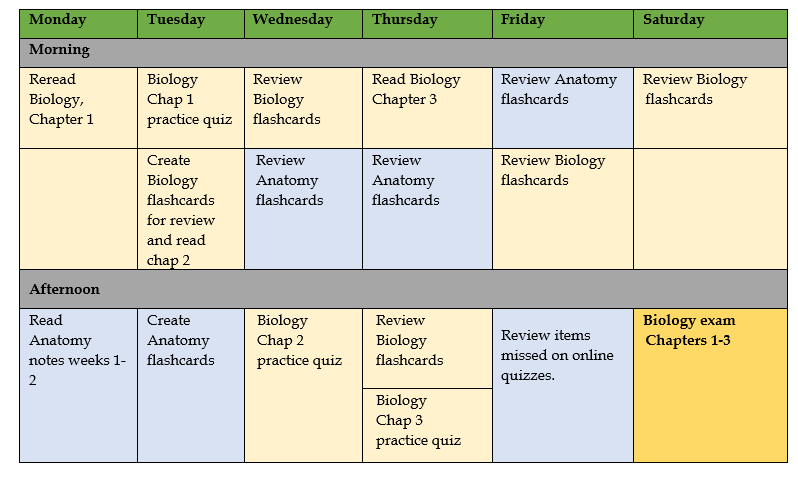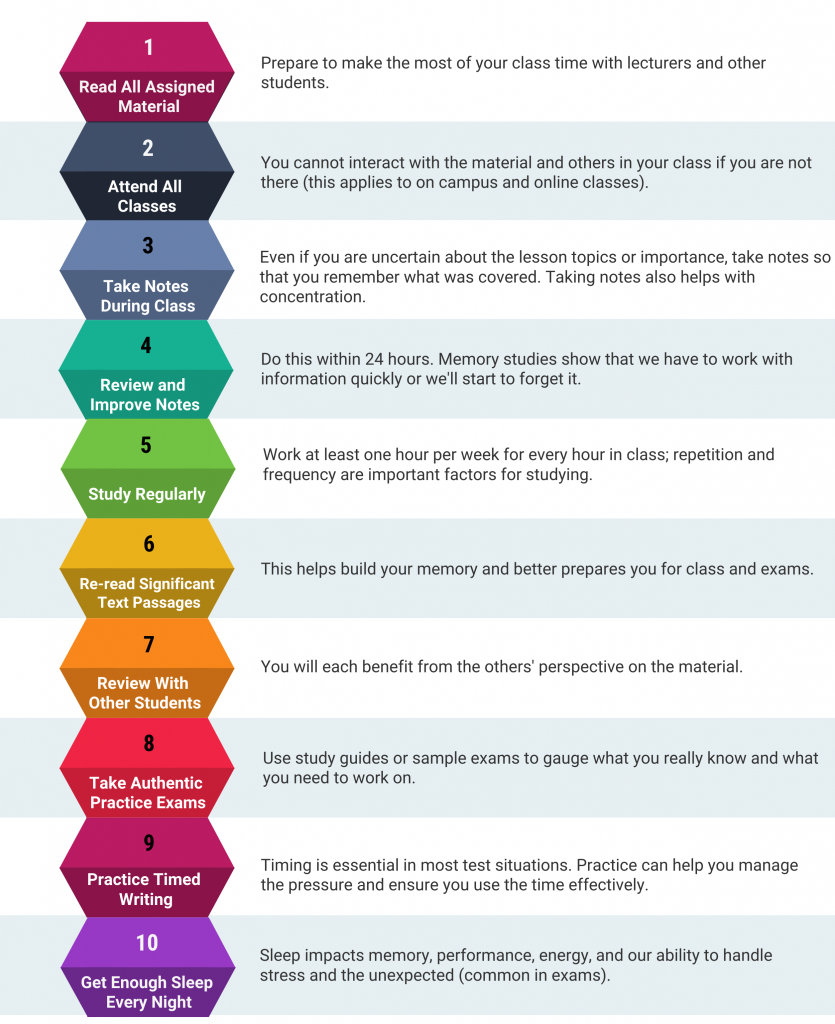Preparing for Exams
Kate Derrington; Cristy Bartlett; and Anita Frederiks

Introduction
Exams are a common method of assessment at university and it is likely that you will need to undertake different types of exams as a student. This chapter is the first of two covering exams. It aims to equip you with the skills needed to plan consistently for your exams. It has a range of techniques to assist you to cope with large volumes of revision information and strategies for improving your memory and retention. It also covers on-the-day exam strategies and tips for dealing with exam stress. If you would like information on preparing for specific types of exams, we recommend that you continue to read the next chapter Types of Exams where essay, multiple choice, short answer, open book, closed and restricted exams, take home, online and numeracy (maths) exams are covered in more detail.
Revision Strategies
When preparing for your exams you are often revising content from your entire semester. We recommend that you consider what you wish to achieve from your study sessions and then choose strategies and approaches that will help you achieve those aims. We have provided a number of strategies (and how they work) to help you choose effective study strategies. Most of these strategies are designed to improve your understanding of the material and increase your ability to recall and use the information in exams.
Memory
Most of the strategies we discuss in this chapter are aimed at making the most of your memory and increasing your ability to recall the information when you need it in your exam. You don’t need to have a complex understanding of memory and how it works to use these strategies, however we have provided a brief overview about why these strategies work in each section. In addition to the revision strategies that we discuss in this chapter, the following will also help you to improve your memory:
- Having adequate sleep (being tired negatively effects our memory)
- Taking regular exercise
- Consuming a healthy diet
- Practising using your memory
- Managing anxiety or stress (see the section on exam anxiety in this chapter)
- Taking regular study breaks and resting
- Having a study, work, life balance and spending time doing things that we enjoy
Spacing
The first exam preparation strategy that you might find useful is spacing. Spacing refers to when you study. This technique requires a consistent approach over an extended period. It uses repetition with breaks or spaces in between study sessions to help you retrieve information. Why is this an effective method? Research suggests that giving yourself time between study sessions helps you forget the information. Strange as this may sound, forgetting is beneficial to remembering information long-term. How does this work? Every time you forget something, your brain must work harder to remember or relearn it. This repetition improves your understanding, retention, problem solving and application of knowledge.
Table 17.1 below demonstrates how spacing works. Assume you are going to spend about seven hours studying for a Biology exam. Cramming would have you spending most of those hours the night before the exam. With spacing however, you would study a little bit each day. See the section on cramming for further explanation why cramming is an inefficient study strategy.
Table 17.1 Spacing vs Cramming

Interleaving
Interleaving is another strategy that you might find useful when preparing for an exam. Interleaving refers to what you study. This technique involves switching between your study topics or subjects to help your memory. Why is this an effective method? Your brain must work harder to process this “mixed up” information. As with the spacing technique, this may cause some short-term forgetting, but can lead to better long-term outcomes for memory and learning. How does this work? This means not just spending each study session on one sort of problem or topic. Within each time block in your study plan, consider mixing up the content that you revise. Use interleaving with spacing to revisit material from a previous chapter or unit or revise different types of problems or question sets.
Table 17.2 Example of interleaving

Using mnemonics
Mnemonics (pronounced new-monics) are an exam revision strategy that can help you to remember things by using letters or phrases as a form of association. For example, if you have studied music you may have been taught the mnemonic device “every good boy deserves fruit” as a way of remembering EGBDF is the order of the notes on the music staff. Another example is NEWS (north, east, west, and south) to remember the points on the compass. Why and How do mnemonics work? When you are unfamiliar with the foundational concepts of a new learning task or process, these help you recall information quickly, especially for lists or processes with multiple steps. Once you are more familiar with your discipline area you probably won’t need mnemonics, but you will probably always remember them. Here are some familiar mnemonics you may find useful:

You can certainly make up your own mnemonics but be careful that your reminder isn’t so complex that it is more difficult to remember than the information you were relating it to.
Practising concept association

Concept association is an exam revision strategy that involves linking the information you are learning with information that you already know. This can help you to make sense of the new information and can improve your ability to recall the information when you need it (e.g. in an exam). For example, you may be reading about different approaches that nurses can take when communicating with a person in their care. If you have experienced being cared for by a nurse, then you can consider which communication approaches the nurse may have used, if they implemented the approach well, and if their communication was effective. This links the information you are learning with existing memories and can also provide you with a deeper understanding of the material and how it relates to the ‘real world’. You do not need to have direct experience with the topic to use the concept association approach. In the above example you may consider how the recommended communication approaches are similar or dis-similar to the approaches you take (or have observed others take) in different contexts. Alternatively, you may consider how the recommendations match with your understandings of good communication skills. The aim is to link the new information with information that you are already familiar with. The links to existing information provide pathways for recalling the new information, and the more pathways you have available the more likely you will be able to recall the information. By considering how the information relates to your experiences or knowledge also prompts you to think about the new information in different ways, which has the added bonus of increasing your understanding of the topic.
Generating idea clusters
The revision techniques involved in creating idea clusters are similar to those used when creating concept associations and mnemonics. They are deliberate techniques aimed at increasing your ability to remember information by connecting the new information with existing information. Unlike concept associations, idea clusters involve linking new material with unrelated, but well remembered information. For example, Andrea is an avid knitter and remembers how to create complicated stitches by associating them with nursery rhymes she read as a child. A complex delicate stitch, that Andrea thinks looks like part of it is hiding, brings to mind Red Riding Hood, and connecting it to that character helps Andrea recall the exact order of steps necessary to execute the design. You can do the same thing with song lyrics, lines from movies, or favourite stories where you draw a connection to the well-known phrase or song and the task you need to complete. This is a similar approach to using mnemonics, however with concept clusters you are linking new information to more complex known material (compared to simpler phrases or words using mnemonics). To be successful, you need to be able to link the new information to a well-remembered story, situation, or knowledge. This is a useful technique when you need to remember a series of steps, or more complex information and you have time to practice the association with an existing memory.
Cramming and why it doesn’t work well

Cramming involves attempting to cram all of the information required for your exam into your memory in a very short period of time, and it doesn’t work very well. It doesn’t work well because our memory works best when we focus on one concept at a time and spend time linking the concept to what we already know. Your brain also needs time to rest. Your brain and memory can only accept so much at any one time, in the same way that you cannot keep lifting a heavy weight indefinitely, you need to rest your muscles. Your brain needs time to rest before it’s ready to accept more information. Cramming does not allow time for this rest to occur.
In addition to not being able to easily recall the information you need in the exam, cramming can also cause stress, memory fatigue, and affect your ability to concentrate. This makes it even more difficult to recall the information in your exam. And if that wasn’t bad enough, you are also more likely to forget (or be unable to retrieve) later, any information that you did manage to recall in the exam. This may be a problem for you in future subjects that build on the information you are learning now. You may be required to spend time re-learning the information later when you are trying to complete future subjects. You are also likely to need to draw on this knowledge in your future career.
While our advice is to avoid cramming, we know that there are times when you may find you only have a short period of time to prepare for your exams. You can adapt the strategies listed above to maximise the effectiveness of the study time you have available. Allocate time to all of your subjects and use a mini interleaving approach where you alternate your study time across multiple subjects. Use mnemonics to assist you and monitor your concentration levels. Taking breaks while you are studying will help you to maintain your concentration during your study block.
Practice Testing
It can also be useful to test yourself both as you revise your work and again before taking the final exam. Practice testing has to do with how you study. It is not enough to just reread content. You must practice or test your ability to retrieve the information from your brain. You can do a practice “test” in a number of ways. For example, you might test yourself as you are reading information. Explicitly ask yourself what a paragraph or section means as you read. You could also read a section in the text, cover the material, and ask yourself, “What was the main idea of this section?” Recite aloud or write down your answer, and then check it against the original information. With practice testing you are not only practicing recalling or remembering the information, you are also thinking about the material in more depth, which creates more connections to existing memories and enables you to more easily recall the information.
This process works also to test your maths understanding. Follow the same principles by writing down the example question, covering up the working and trying it yourself. Then check your answer and working with the example provided. Do as many questions as you can, to assist with recalling the methods more readily when you are under pressure in an exam. Another way to practice test is to create flashcards or design your own test. This takes more time, but there are online programs (apps) that make it easier. Practice testing is an effective study strategy because it helps you practice or rehearse retrieving information and skills, which is important when taking the real exam. Another way to learn something is to teach it to someone else. Ask a friend or family member if you can explain something to them or practice a skill with them. You may find you know more about the subject than you thought, or it might highlight any gaps in your understanding. You can replicate the experience an actual exam produces by including timed writing into your study sessions. You don’t need all of your study time to exactly replicate the exam but find out the exam format in advance and practice the skills needed. For example:
- For a history or law course where you may have to write essay style responses, set a timer and practice how much you can write in this time.
- For a mathematics exam, where you need to complete problems and show working, incorporate timed problem-solving into your study.
- Practice answering questions within a set time limit and with only the resources you will have in the exam.
Practicing under similar conditions to your exam will help you feel better prepared and confident in the exam. Create an environment where mistakes are safe and are expected as just another part of learning. This relates to the principles you learned in the section on grit and persistence (see Goals and Priorities chapter). An example of this might be taking practice quizzes on your own, outside of the more formal course activities. These quizzes could be found in your textbook, in tutorial activities, online, or you may develop quizzes with another student. Studying with a partner can increase your learning, since to create a good quiz you would need to learn the main concepts of the subject and answering the questions on your partner’s quiz might help you identify areas where you need more knowledge. The main idea with this practice is that you are creating an environment where it is safe to make mistakes, and importantly, learn from them. This should allow you to avoid those same mistakes in your formal assessments.
Taking the Exam
In the lead up to your exam
Preparation and planning are the keys to exam success. Check that you know:
- The date, location and time of your exam (e.g., which campus, online, or at a study centre).
- The transport and parking arrangements for exam day. Find out where you can park and what are the costs and payment options.
- The identification you require for admission into the exam (e.g., student ID, or drivers licence).
- The type of exam and how long you have for completion.
- Will there be additional perusal time before the exam commences (particularly for in person exams) where you can read and think about your response.
- What you are allowed to take into the exam.
- How much time to allocate to each question or section of the exam.
Knowing this information will help things run smoothly on exam day and reduce your stress. It will also impact the type of revision you do and the materials you may or may not be allowed to take into the examination room. There is more information about different types of exams and what they involve in the Types of Exams chapter.
If your exam is online, there are other considerations you need to organise prior to taking your exam. These may include the following:
- Ensure you have a reliable device (laptop or computer) and internet connection.
- Ensure you have all the required hardware to complete your exam (e.g., printer or scanner).
- Test all devices and equipment prior to undertaking your exam.
- Have all the items you require to complete your exam ready (e.g., calculator, translation dictionary, etc.)
- Test comfort levels before you start (e.g., lighting, temperature, and seating).
- Remove distractions (e.g., turn off your mobile phone and television).
- Prepare for the online assessment just like you would for other exams.
Consider making an exam day plan as outlined in Table 17.3. This will help you to use your exam time effectively.
Table 17.3 Exam day plan

On the day of your exam
On the day of the exam it is important to maintain your focus and remember your exam plan. For example, it can be helpful to wait quietly when you first arrive at the exam location rather than talking to your peers who may disrupt your thought processes. If you begin to feel rushed, return to the plan that you compiled in the lead up to the exam. This may assist you in gathering your thoughts, and organising what you are allowed to take into the exam. Consider the following exam day tips outlined below. This may assist you on arrival to a face-to-face exam or as you prepare to begin an online exam.
Arriving at the exam/ preparing to start an online exam
- Get to the exam location or be prepared to start your online exam in plenty of time so you do not feel rushed
- Don’t let other students interrupt your thinking and try not to compare what you have learned with others
- Get to your designated place, organise whatever materials you can have, and calm your mind
At the beginning of your exam you will be provided with exam instructions. This might include information about how to respond to the exam question, if multiple choice, or explain how short response items will be marked. It is important to carefully listen to or read directions to ensure that you complete the exam as required. The following section outlines some considerations to optimise your exam performance.
Taking the exam
- Listen carefully for any verbal directions or read the exam instructions carefully (if an online exam).
- As soon as you receive the exam, scan quickly and familiarise yourself with the requirements and any choices if applicable (use perusal time if available).
- Read the instructions carefully. Consider any options to choose questions, e.g., two from a selection of four short-answer questions. Misreading instructions and answering more questions than is necessary will not give you any additional marks and waste time that could be spent on another section of the exam.
- Decide how you will allocate your time for each section (you should know this if you have made an exam plan).
- Answer every required question on the exam. Even if you don’t complete each question, you may receive some marks for partial answers. Find out before the exam if marks will be allocated for partial answers.
- Answer the questions about which you are the most confident first.
It is an achievement, and often a relief to finally reach the end of the exam. It can be tempting to leave the exam location or log off early if you haven’t used all of the allocated time. It is, however, advised that you use all the time available to maximise your chance of success. You can use this valuable time to review your responses and check your answers. Imagine that you accidentally missed an entire question, using the time at the end of the exam wisely would help you avoid this issue. The section below summarises some of the ways you can use extra time at the end of an exam.
At the end of the exam
- Allow time to review your answers. Use this time to check your maths calculations, review an essay for grammatical and content errors, or answer the difficult multiple choice questions you skipped earlier.
- Finally, make sure you have completed the entire exam: check the backs of pages, and verify that you have a corresponding answer section for every question section on the exam. It can be easy to skip a section with the idea you will come back to it but forget to do so.
Exam Anxiety

It is natural to experience some exam stress or anxiety. The good news is that there are a number of strategies you can use to manage any exam anxiety so that it does not become overwhelming. However, we recommend that you seek additional support if you find that your coping strategies are not working, or if exam stress is affecting your ability to undertake your studies. Below are some strategies that can be useful in managing exam anxiety or nerves.
- Be prepared for your exams. Knowing that you are prepared for your exams will help reduce exam stress.
- Physical activity will help you manage stress. Try to incorporate regular exercise in your schedule.
- Do not underestimate the effectiveness of controlled deep breathing. Taking deep, slow breaths can help you focus. This can be particularly useful in exams.
-

Figure 17.6 Almost everyone experiences some form of exam anxiety, practice using techniques that help you maintain your calm. Image by Robert Owen-Wahl used under CC0 license. Have a healthy diet and drink plenty of water. What we eat does influence how we feel. However, we don’t recommend that you suddenly increase the amount of water you drink the night before the exam.
- Get some sleep. Getting enough sleep is important, particularly in the lead up to your exams.
- Find what helps you relax, such as music, going for a walk, going to the beach, and schedule those things in your planner. For example, playing music that you enjoy can help you relax and feel less stressed.
- Learn effective relaxation techniques including controlled breathing, visualisation, and meditation. These can help while you are in the exam itself too.
Special Accommodations for exams
Most universities will have processes in place to provide students with reasonable adjustments to their exam conditions for students who meet disability support or equity criteria. This can include additional time to undertake the exam, assistive technologies, furniture adjustments, or alternative locations. The aim is to provide an equitable exam experience and opportunities for academic success. We encourage you to contact your university for information about their specific services and support.
When things go wrong
Sometimes things just don’t go to plan on exam day. For example, you may be unwell on the day of your exam, or experience computer issues when undertaking an online exam. Your university will have processes in place for managing these circumstances. There are often time limits for rectifying issues on exam day, so contact your university as soon as practical when you realise you won’t be able to undertake your exam. We recommend that you know in advance how to contact your university for support during online exams, so if the unexpected does happen (e.g. someone cuts your internet connection) you are prepared and know what to do.
Checklist for exam success
The checklist below provides key strategies that will help you in your studies.

Conclusion
Exams are a common method of assessment at university and there are many different types. In this chapter we have introduced you to the idea of consistent planning for exam success. A variety of strategies were discussed to assist in coping with revising large volumes of material. Specific strategies to target memory and retention such as spacing, interleaving and practice testing were explained. The chapter also discussed what to do on the day of your exam to maximise your success and minimise your stress. The next chapter Types of Exams is recommended for more information on preparing for specific types of exams, such as essays, multiple choice, short answer, open book, closed and restricted exams, take home, online and numeracy (maths) exams.
Key points
- Start preparing early with regular and consistent study
- Make a study plan and stick to it
- Use memory strategies; try spacing and interleaving. Find what works for you.
- Know your exam type and practice accordingly
- In the exam, answer all questions, and show all your working
- Know the requirements for undertaking your exam (what you can take in with you) and have them ready
- Plan how you will get to your exam, including where you will park and how long it will take to get there, to avoid exam day stress
- It is common to experience exam anxiety, but strategies such as deep breathing can help you remain calm in your exam

